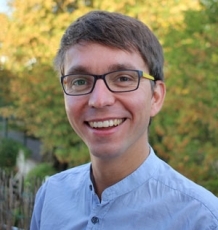
Dr Bertram Daum
Senior Research Fellow
B.Daum2@exeter.ac.uk
7455
Living Systems Institute Living Systems Institute T03.1
Living Systems Institute, University of Exeter, Stocker Road, Exeter, EX4 4QD
Overview
I am a Senior Research Fellow in the Living Systems Institute.
Follow me on Twitter: @DaumLaboratory
Visit our lab's website: daumlab.exeter.ac.uk
Qualifications
2014: Dr phil. nat. in Biology, University of Frankfurt, Germany
2008: MsSc in Biology, University of Kassel, Germany
Career
2018 - Present: Senior Research Fellow at the Living Systems Institute, University of Exeter, UK
2017 – 2018: Research Fellow at the Living Systems Institute, University of Exeter, UK
2014 – 2017: Postdoctoral researcher at the Max-Planck-Institute of Biophysics, Frankfurt, Germany
2008 – 2014: PhD research at the Max-Planck-Institute of Biophysics, Frankfurt, Germany
Links
Research
Research interests
Archaea are ubiquitous microorganisms that are the ancestors of all eukaryotic life and inhabit diverse environments ranging from the most extreme to the human body. Archaea that are part of the human microbiome are increasingly recognised as key health factors in metabolic conditions such as obesity. Moreover, protein complexes derived from extremophilic archaea are ultra-stable and highly resilient to extreme conditions such as heat, pH and salt and are thus of great interest for bio- and nanotechnology. My lab employs state-of-the-art single particle electron cryo-microscopy and cryo-tomography to investigate the structure and function of archaeal surface proteins. These include S-layers, which form highly stable cage-like proteinaceous cell walls and the archaellum, a filamentous molecular machine used for rotary propulsion, surface adherence, biofilm formation and cell-cell communication. Our work will provide detailed information about how archaea move through and interact with their (microbiomal) environment and inform new approaches to exploit s-layers and the archaellum machinery in nanotechnology and drug delivery.
Group members
Dr Kelly Sanders (Lab Technician)
Dr Patricia Gil-Diez (Bioimaging Technician)
Dr Mathew McLaren (Experimental Officer for cryoEM)
Dr Lavinia Gambelli (Postdoc)
Matt Gaines (PhD student)
Equipment
Our brand-new lab is home to cultivation equipment for thermophiles, a cryoEM sample preparation facility, a cryo-capable 120 kV FEI T12 electron microscope for sample screening and a cutting-edge GPU computer cluster for image processing. For high resolution imaging, we share a 200 kV Talos Arctica electron microscope with the University of Bristol.
In the news
http://www.exeter.ac.uk/news/featurednews/title_603910_en.html
https://phys.org/news/2017-08-scientists-snapshots-molecular-propeller-degrees.html
http://www.sciencenewsline.com/news/2017082417090076.html
http://www.hitechdays.com/browser/253317/
Research projects
Biohybrid Microrobots inspired by Microbes
Biohybrid MicroRobots (BMRs) are conceptual microscopic robotic devices that combine synthetic and biological components and can be remote controlled to a specific destination, attach to a target and perform a bespoke biochemical operation at nanoscale precision. Within the 5-year Microrobots project, we intend to develop innovative BMRs by combining magnetic swimmers with prokaryotic S-layers. Read more on the project page.
Publications
No publications found
External Engagement and Impact
Administrative responsibilities
I am currently chairing the Steering Committee for the South West Regional Facility for GW4-shared High-Resolution Electron Cryo-microscopy at the University of Bristol.
Awards
in 2014, I received the Otto Hahn Medal from the Max-Planck-Society for outstanding junior scientists.
In 2014, I received the Young Investigator’s Prize from the Heinz-Bethge Foundation for Electron Microscopy. The award recognises extraordinary contributions to the field of cryoEM.



